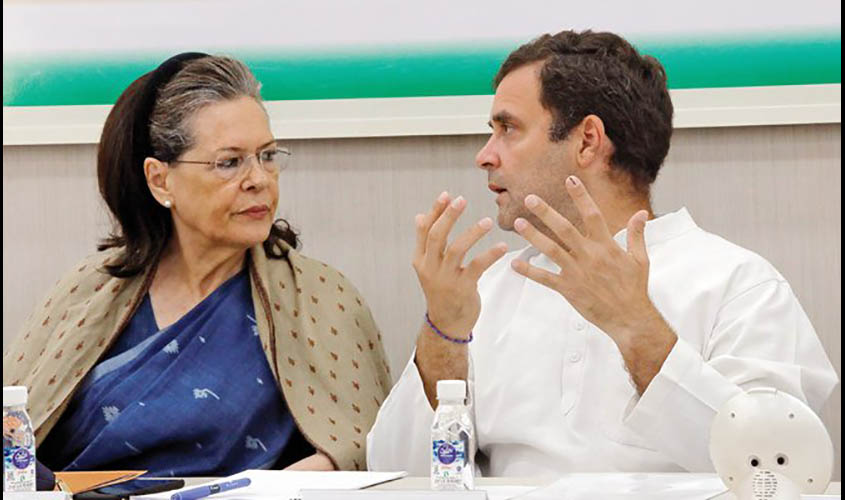The delay in naming the successor of Rahul Gandhi could be on account of an inherent fear amongst the Gandhis that they could subsequently possibly be let down by their loyalists. On the face of it, this apprehension may appear unfounded, given that the top hierarchy of the party is crowded with hand-picked leaders, who over the years, time and again, have displayed their allegiance to the family. However, in politics, things sometimes transform rapidly and unexpected developments occur from even the most trusted quarters.
The primary reason for the Gandhis being so central to Congress politics was because they have been vote catchers in whose name the party has won many difficult elections. In the last two Parliamentary polls, the Congress has performed dismally, and therefore the family is no longer seen as an electorally potent entity.
The situation has deliberately or methodically been allowed to linger on, so as to give sufficient time to senior leaders to somehow convince Rahul Gandhi to reconsider his decision of resigning as the president. The consequence, so far, is that with no leader at the top to take charge, the Congress is imploding. The defection of a sizeable number of MLAs from the grand old party to the BJP has reflected poorly both on the high command as well as the saffron brigade, the latter which is being accused of engineering splits to augment the numbers. The BJP surely does not need to use defectors after scoring such a grand victory under the overall leadership of Narendra Modi in the recent elections.
The ambiguity within the Congress on appointing a new president has its genesis in a similar situation that had arisen way back in 1977, after the Janata Party came to power, and when both Indira Gandhi and Sanjay Gandhi lost their elections from Rae Bareli and Amethi, respectively. Devkant Barooah, known for his “India is Indira and Indira is India” slogan, was no longer acceptable as the president of the party. In a damage control bid, to counter the implications of such a massive defeat, Indira Gandhi swung into action and put up K. Brahmananda Reddy as her candidate for the Congress president’s position.
The former Prime Minister’s vulnerability was evident, and Dr Karan Singh, who was amongst the three Congressmen to have been elected to the Lok Sabha from North India, threw his hat in the ring. Reddy, with Indira’s support, emerged victorious and Dr Karan Singh managed to garner merely five or six votes. However, it soon became clear that she had made a colossal mistake by backing him. At a session where Reddy was to deliver his acceptance speech on being made the party chief, Indira Gandhi arrived at the venue five minutes late. Reddy, had by that time, commenced his speech and a taken-aback Indira told party activists, who had lined up to receive her, that it was for the first time the protocol had been broken.
The old guard, who were still with the Congress, including Y.B. Chavan, the then Leader of Opposition in the Lok Sabha, and many others, began wresting control of the organisation. Many senior leaders had joined the Janata Party, along with Babu Jagjivan Ram and Hemvati Nandan Bahuguna, but within the rank and file of the Congress, a revolt was in the offing against both Indira and Sanjay. In the last week of December 1977, at a historic meeting of the party held at its headquarters, then located at 5, Rajendra Prasad Road, Indira Gandhi was expelled from the organisation. However, not deterred by the behaviour of her one time staunch supporters, she within a few days announced the formation of Congress (I) on 1 January 1978 appointing Buta Singh as the sole general secretary.
Thereafter, she took on the combined might of her former colleagues, who aligned themselves with Reddy and Chavan on one hand and the Janata Party controllers on the other hand. The hand symbol was granted to her, largely because of the persuasive qualities of her supporter, Bansi Lal Mehta, who convinced the then Chief Election Commissioner, S.L. Shakdhar to concede to her request. Soon after that the first Lok Sabha byelection won by Congress (I) was in Azamgarh where the party’s nominee Mohsina Kidwai defeated Chandrajit Yadav, a once trusted aide of Indira Gandhi.
It is in fact, this particular event in the history of the Congress, which the current leadership does not know how to put aside. The apprehension being that if what Reddy did to Indira was replicated by leaders, who are at present viewed as loyalists, what would be the outcome? In politics, possibilities often change the mindsets of the players who always wish to be on the winning side.
The Congress high command lacks the tenacity and grit of Indira Gandhi and Sanjay, who had fought back with new cadres and young leaders to win back power in 1980. To begin with the Congress had only one general secretary, Buta Singh, and shortly after the state elections were set into motion, Abdul Rehman Antulay was also drafted to be a general secretary.
The Congress high command is at its weakest condition following the 2019 results. Indira Gandhi and Rajiv Gandhi’s political adviser, Makhan Lal Fotedar had predicted after the debacle in 2014 that the party had reached a cul-de-sac. He had concluded that a revival was virtually impossible since, “Sonia is not Indira and Rahul is not Sanjay”. Prophetic words, unless things take a turn in a different direction. Between us.

